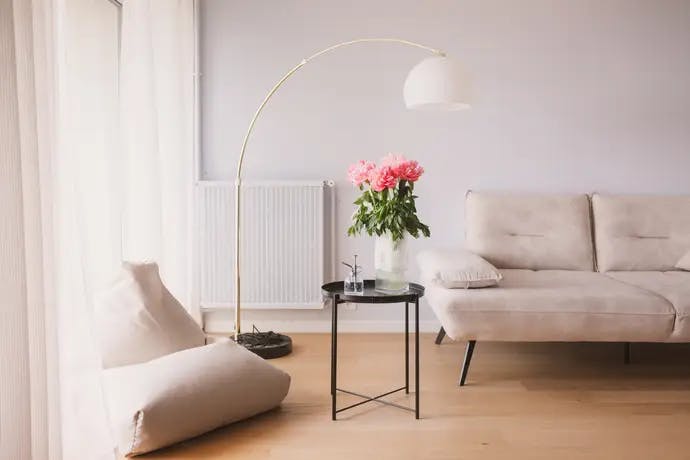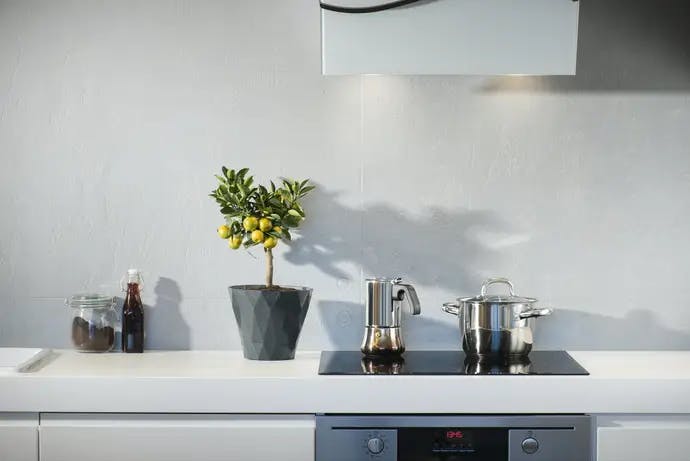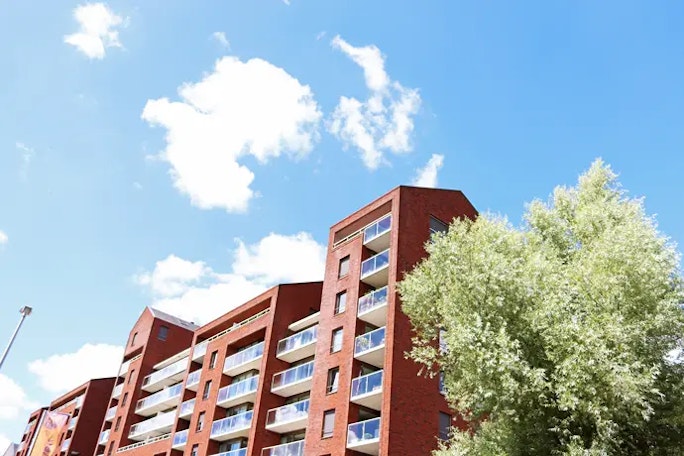Table of contents

Are you about to view a house for the first time soon? Or has it been a while since you've done a viewing? It's good that you're reading up on it, because the moment is short and the decision is big. With our 7 steps for viewing a property, you'll know exactly what to do and what to look out for.
Download our handy Checklist House Viewing. It lists all the tips and steps. Print it out and take it with you to the viewing of the property. That way, you can be sure you won't forget anything.
Go directly to:
- Step 1: Check the energy label, buyer's costs / freehold, and any ground lease
- Step 2: View the neighborhood and surroundings
- Step 3: Check the exterior of the property
- Step 4: Check the HOA (if buying an apartment)
- Step 5: Check the condition of the interior of the property
- Step 6: Check the appliances
- Step 7: Ask the selling real estate agent many questions
Preparation
There are a few things you can research prior to the viewing. We strongly recommend doing this preparation so you don't waste time viewing a property that doesn't meet your requirements.
Step 1: Check the energy label, buyer's costs/freehold, and any ground lease
Have you found a property you'd like to view? There are several factors that can significantly increase the costs of the property. It's wise to investigate these points before the viewing. They give you insight into the expected monthly and any additional costs of the property.
- The energy label: check the energy label in the specifications on Funda. Or ask the selling real estate agent about it. The better the energy label, the more sustainable the property is. That saves you significantly on costs.
- Buyer's costs or Freehold: check whether the property is being sold with buyer's costs or freehold. That way, you'll know what additional costs you may face if you buy the property.
- Any ground lease: check whether there is a ground lease on the property. You can see this in the specifications on Funda. If nothing is found, be sure to double-check with the selling real estate agent. You'll quickly pay tens of thousands of euros extra for a house with ground lease.
Read more about the costs when buying a property so you know what to consider. Have you checked the points and are still enthusiastic? Great! Let's move on to the next step.

Step 2: View the neighborhood and surroundings
It's important that you feel at home in the neighborhood where you might live. Therefore, it's wise to do some preliminary research on the neighborhood and surroundings of the house. Below, you'll find questions you can ask yourself and how to find the answers.
Good to know in advance: you can ask these questions to the selling real estate agent during the viewing. But remember that he or she is there to sell the property. The answers are therefore never 100% objective. They sometimes paint things more favorably than they are. Therefore, we always advise hiring a buying real estate agent and asking him or her for advice.
What is the safety of the neighborhood like?
It's naturally important that you feel safe in the neighborhood. Therefore, go to the viewing a little earlier to walk (or cycle) through the neighborhood and get a feel for the atmosphere. Do you feel at home? What type of people are around? Are there children playing on the street? Is the property on or near a dangerous road? And how fast are the cars driving?
You'll probably view the property during the day, but it's also important to know how the neighborhood feels in the dark. Do you have friends or family living in this neighborhood? Ask them for their honest opinion. Or ask your buying real estate agent; he or she probably knows a lot about the area.
Additionally, you can of course use Google to assess the neighborhood's safety. What news items have been published about the neighborhood recently? What is the neighborhood known for? What initiatives are being started? This way, you'll quickly form a picture.
Is there noise pollution?
Many television programs have been made about it: neighbor disputes due to noise pollution. Few things are more annoying than not being able to relax within the walls of your own home. Of course: an occasional party or a neighbor's DIY project is part of it. Especially in a densely populated city. But structural noise pollution is something you'd rather avoid.
To prevent buying a house where you suffer from structural noise pollution, it's better to do some research. You can start by asking the sellers or the selling real estate agent the reason the property is being sold. If there is already noise pollution, they are unlikely to tell you honestly, but it's worth a try.
If nothing comes out of that, investigate what the property's location can tell you about potential noise pollution. Is it located on a (busy) road? Are there many planes flying over? Or is the house, for example, opposite a primary school or daycare center? During the viewing, don't forget to check for noise pollution with the door closed and open, both at the front and back.
Additionally, it's good to look at what kind of neighbors you will have - before or after viewing the house. What does the outside of the house say about the type of people who live there? Does everything look calm and tidy? Is the balcony full of beer crates? Or do you hear several dogs barking from the neighbor's backyard? You might even consider ringing the doorbell. You can ask them some questions about the neighborhood!
Who are the neighbors?
Better a good neighbor than a distant friend. The saying is not without reason. Neighbors can greatly impact your living enjoyment, positively and negatively. It's a nice bonus if you build a good relationship with your neighbors. An occasional joint barbecue, borrowing something, watering each other's plants during vacations. It seems small, but it makes a world of difference for your living enjoyment.
If you have children, they grow up with the neighborhood kids. They are shaped by the friendships they make there. It's important that your new neighbors are people you get along well with (and who share the same values as you). Even if you don't value a good relationship with your neighbors, it's still nice to be able to count on each other if something happens. And not to have noise pollution.
Ask the sellers or the selling real estate agent candidly about the neighbors. What can they tell you about them? What's their relationship like? Are there joint activities organized? To really get a good picture, the best thing to do is to ring the doorbell at the neighbors themselves. This way, you immediately get a good idea. Generally, people like to talk about their neighborhood and themselves, so just try it! Hopefully, they'll make a good impression.
Do you value your privacy? Check whether there is an insight into the property or garden. Do you have enough privacy? Or can the neighbors easily see into the living room, kitchen, or garden? If so, it's good to investigate what measures you can take to increase your privacy. For example, by placing a hedge or installing curtains.
What facilities are in the neighborhood?
Make a list in advance of the facilities you want to have nearby. Think of facilities like:
- a shopping center
- a daycare or primary school
- a gym or sports club
- hospitality venues
- playgrounds or parks
- public transport
Research online whether these facilities are within walking or cycling distance. To see if the facilities are what you expected, you can visit them before or after the viewing. Can you see yourself (and your family) living here? Is there a pleasant atmosphere? What type of people are around? 
What are the parking options?
Do you have a car? Or do you often have visitors who come by car? Then it's useful to investigate the parking options in advance. Is there a private parking space at the house? Can you park for free in the neighborhood? Is it possible to apply for a parking permit and (quickly) get one? Or is there paid parking?
Besides the parking costs, it's also important that there are enough parking spaces available. Check in the morning, afternoon, and evening to see how many parking spots are empty. If everything is full, it's likely more challenging to find a good parking spot at busy times. That's something to keep in mind.
Do you have an electric car? Check if there are enough charging stations in the area. And if there's the possibility to charge your car at home.
What are the municipality's plans?
The last thing you can do before viewing the house is to research the municipality's plans for the neighborhood. Your buying real estate agent will be happy to inform you about this. Are new apartment complexes being built opposite your property, changing your view? Is there investment in more greenery in the area? Or is a brand new shopping center being built around the corner? It's better to know!
Read more about buying a property:
During the viewing
After doing the necessary research, it's time to view. Below you can read the steps you go through during the viewing so that you're not faced with unexpected surprises later.
Step 3: Check the exterior of the property
Don't walk straight to the doorbell when you visit. Come 5 or 10 minutes early and check the exterior of the property. Pay extra attention to the following things:
- Paintwork: how does the paintwork look? Is everything in good condition, or does it need a (significant) touch-up?
- Frames: how do the frames look? What material are they made of? What is their condition? And do all windows have double glazing?
- Facades: check the facade for age and other issues. Are there any cracks or moisture spots? What is the condition of the masonry and joints?
- Roof and gutters: check the condition of the roof and gutters.
- Foundation: ask about the condition of the foundation. It's often hard to see with the naked eye unless there's a clear subsidence of a property.
- Asbestos: is the property you're viewing built before 1991? Explicitly ask if there is asbestos in or around the property.
- Underground tank: is the property you're viewing built before 1970? Ask if there's an underground tank in the garden. Leaking tanks can contaminate the soil.
- Recent renovations/what can be renovated: note recent renovations and possibilities for renovation.
We realize these are many points to pay attention to. A viewing often passes by quickly. Therefore, it's handy to download our Checklist House Viewing and bring several people to a house you are really enthusiastic about. Preferably people who understand construction structures. These can be people from your network, but a buying real estate agent can also assist you here.
Did the viewing fly by, and you missed a few details? Sometimes it's possible to request a second viewing; make use of that. Additionally, it's of course possible to have a structural inspection carried out. This way, you'll find out everything about the exact state of the property and any hidden defects. 
Step 4: Check the HOA (in case of an apartment)
If you buy an apartment, you become a member of the Homeowners' Association (HOA). You're in this association with the other owners of the apartments in your complex. Together, you're responsible for the management, maintenance, and finances of the common areas of the building. Think of the entrance, stairwells, any elevators, and roofs. You pay a monthly contribution for the costs.
It's important to know how much you pay monthly for service costs. This amount comes on top of your costs for a (potential) mortgage. Additionally, it's helpful to ask the selling party the following questions:
- How much money is in the reserve fund (the 'reserve pot')?
- What is the condition of the building maintenance?
- Is there a long-term maintenance plan?
- Who manages the HOA?
You can request the latest figures and minutes from the HOA. This and the rest of the answers to your questions will give you a good picture of the HOA's financial state and organization. This way, you won't face surprises after purchasing a property, such as a large expense for which you need to pay extra because there's no money left in the reserve fund.
Step 5: Check the condition of the interior of the property
Once inside, your attention will likely quickly go to the rooms and the light in the property. But also pay attention to the layout of the property. Is it practical for you? Is there enough space? What are the possibilities?
Additionally, it's a good idea to check the condition of the interior of the property. Always check:
- For any odors: do you smell sewage, leakage (mold), mice? Or has smoking occurred in the property?
- The condition of the walls and ceiling: what is the state of the plaster and paintwork? Do you see moisture spots?
- The condition of the floors: are the floors uneven? Are the skirting boards loose? Does the floor creak? Does everything look neat?
- The condition of the doors, windows, and frames on the inside: do they open smoothly? What is the condition of the frames? What is the condition of the paintwork? Do the windows have double glazing?
- The storage space: is there enough storage space? Are there moisture problems? Does everything look neat?
- The kitchen and bathroom: is it decorated to your taste? Is all the equipment you need present? Is it new or outdated? Does everything work properly?
Ask your buying real estate agent or companions to look around and give their opinion. Don't forget to take photos so you can review everything at home.
Of course, you can later have a structural inspection carried out. This will reveal defects in the interior of the property. However, it's handy to be aware of this already. This way, you'll know immediately what you're dealing with.
Step 6: Check the appliances
During the visit to the property, check the following appliances, and ask any questions you have about them. Think of appliances like:
- The boiler/heat pump/heating
- The kitchen appliances that will remain
- The meter box
- Any solar panels
Also, take photos of these appliances.
Step 7: Ask the selling real estate agent many questions
It was already mentioned briefly above: the importance of asking questions to the selling real estate agent. Ask him or her all the questions you have about the previous steps. For example, about the condition of the property, the neighborhood, and the HOA (when applicable). Write them down beforehand so you don't forget anything.
Additionally, it's useful to ask questions about the residents and the sales process, such as:
- How long has the resident lived in the house?
- What is the reason the current resident is moving?
- How long has the property been for sale? (useful for determining the right offer)
- How much interest is there in the property / how many viewings are scheduled?
- How can you make an offer on the property?
- When is the property available?
- Are there items that can be taken over?
Read more about what you need to know about buying a house.
Download our handy 'Checklist House Viewing'
Have you read through all the tips and would you like to take a summary with you to your viewing? Download our handy Checklist House Viewing and check off the steps one by one. That way, you can be sure you've thought of everything!
Tip: hire a buying real estate agent
No matter how well you prepare, you'll always have questions. With a good buying real estate agent by your side, you'll be supported from A to Z during the purchase process. That saves you a lot of time and worries. Moreover, it increases your chances of finding & buying your dream property.
Through Mijn Verkoopmakelaar you can quickly and easily find the best real estate agents in your area. They are checked for reliability and have knowledge of the market. You receive multiple price proposals, allowing you to save up to 40% on a real estate agent. You can use our service for free and without obligation, so give it a try!
Find a purchasing agent- Free & without obligation
- Contact via email
- Compare based on performance
Read more about buying a house:
Frequently asked questions about viewing a property:
1. What is a viewing?
Viewing a property is an appointment where you physically visit a property to look at, inspect, and assess it before deciding whether you want to buy it. During the viewing, you can assess the layout, condition, and general atmosphere of the property. There is an opportunity to ask questions about the property to the seller or real estate agent.
2. How much time do you have for a viewing?
There is usually a limited time available for viewing a property, typically around 15 to 30 minutes. The exact duration depends on the seller, the real estate agent, the size of the house, and specific circumstances. The visit takes place within the agreed time slot. It's important to use this time efficiently to inspect the property and ask any questions you may have.
3. What questions should you ask during a viewing?
During a viewing, you can ask any questions you have. To gain a better understanding of the property and know if it meets your needs, you can, for example, ask the following ten questions:
- What is the reason for selling this property?
- How long has the property been on the market?
- Have there been any recent renovations or improvements to the property?
- Are there any known defects or issues with the property?
- What about the neighborhood and nearby amenities?
- Are there specific items included in the asking price (such as furniture or appliances)?
- What are the monthly costs for the property (such as service charges, taxes, etc.)?
- Are there special rules or restrictions regarding the use of the property or the building?
- How does the bidding on the property work?
- Are there any other potential buyers who have shown interest?
Feel free to add to the list with other questions you have.
4. Is a viewing mandatory (duty to investigate)?
Viewing a property is not mandatory, but it is strongly recommended to avoid unpleasant surprises. As a buyer, you have a duty to investigate to examine the condition of the property before purchasing it. The seller has a duty to inform (duty of disclosure) and must inform you as fully as possible about the house.
If you do not view the property, you risk missing hidden defects or issues, which can lead to financial and legal complications. Therefore, it is wise to conduct or have conducted thorough research before entering into a purchase agreement.
5. How many viewings are there per house?
The number of viewings per house varies greatly and depends on factors such as location, price, and market conditions. There is no set number of viewings; it is arranged based on the interest of potential buyers. Most houses receive between 5 and 15 viewers before a buyer is found, but this can vary.










